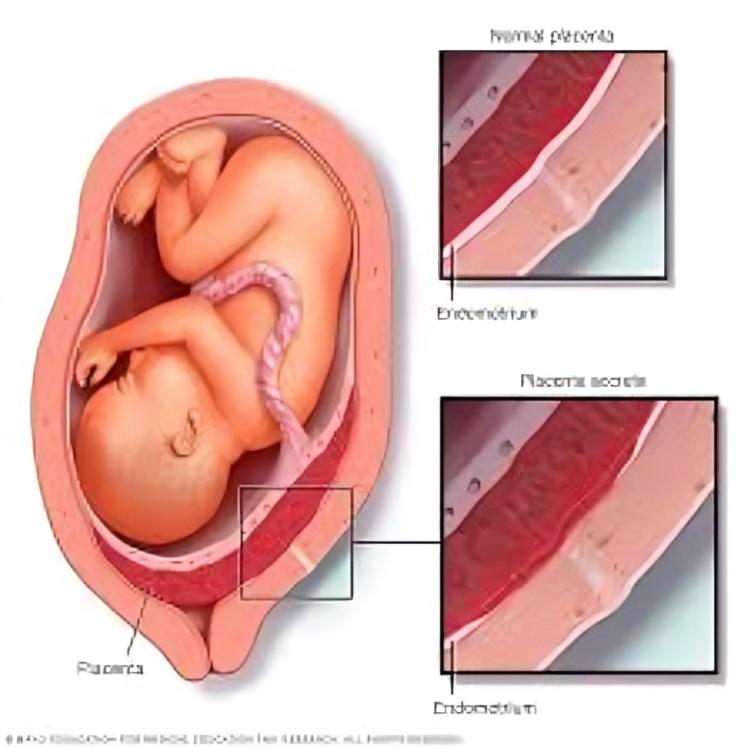Placenta Accreta: Everything You Need to Know with Dr. Sahar Abd El-Moneim Hassan
Placenta accreta is a rare but serious condition that occurs when the placenta grows abnormally into the uterine wall.

By: Dr. Sahar Abdelmoniem Hassan
🩺 Placenta Accreta: Everything You Need to Know with Dr. Sahar Abd El-Moneim Hassan
Introduction
Placenta accreta is a rare but serious condition that occurs when the placenta grows abnormally into the uterine wall. This condition causes the placenta to adhere strongly to the uterine wall, making it difficult for the placenta to separate after childbirth. Since the placenta plays a crucial role in supplying nutrients and oxygen to the fetus during pregnancy, any issues with the placenta can directly affect the health of both the mother and the baby.
I am Dr. Sahar Abd El-Moneim Hassan, a specialist in obstetrics and gynecology. I would like to share with you some important information about this condition and how to manage it to ensure your health and the health of your pregnancy.
🔸 What is Placenta Accreta?
Placenta accreta occurs when the placenta grows abnormally into or through the uterine wall. In a normal pregnancy, the placenta detaches from the uterine wall after childbirth. However, in placenta accreta, the placenta is abnormally attached, making its detachment difficult after delivery, which may lead to severe bleeding and require urgent surgical intervention.
Types of Placenta Accreta:
Partial Placenta Accreta: When the placenta is partially attached to the uterine wall.
Placenta Increta: When the placenta invades deeply into the uterine wall.
Placenta Percreta: When the placenta penetrates through the uterine wall and can reach other organs, such as the bladder.
🔸 What Causes Placenta Accreta?
Although the exact cause of placenta accreta is unknown, several factors can increase the likelihood of this condition, including:
History of Cesarean sections: Scarring from previous cesarean deliveries increases the risk of placenta accreta.
Medical history: Conditions such as uterine fibroids or infections can contribute to this problem.
Advanced maternal age: Women over 35 years old are more at risk for placenta accreta.
Multiple pregnancies: Such as twins or more.
Genetic factors: Having family members with a history of the condition can increase the risk.
🔸 Symptoms of Placenta Accreta
Placenta accreta often doesn't show clear symptoms during pregnancy. However, symptoms may appear during or after delivery, with the most common symptom being:
Excessive bleeding during or after delivery.
Abdominal pain and swelling, which may result from abnormal contractions.
Difficulty in placenta separation after delivery.
If you experience any of these symptoms, it’s essential to visit your doctor immediately.
🔸 How Is Placenta Accreta Diagnosed?
Placenta accreta is typically diagnosed using advanced medical imaging such as:
Ultrasound: It helps to determine the location and density of the placenta.
Magnetic Resonance Imaging (MRI): This can assess the extent of the placenta’s attachment to the uterine wall.
Physical examination: After delivery, the doctor may examine your condition to confirm the presence of placenta accreta.
🔸 Treatment for Placenta Accreta
Treatment for placenta accreta depends on the severity of the condition (partial, complete, or percreta). In most cases, a cesarean section is performed. In some severe cases, hysterectomy may be required.
Treatment Procedures May Include:
Early Cesarean delivery if placenta accreta significantly affects the fetus.
Removal of the placenta after delivery to minimize bleeding.
Hysterectomy in severe cases where the condition cannot be managed.
🔸 Risks and Complications
Placenta accreta can cause several severe complications, such as:
Severe bleeding that may threaten the mother's life.
Injury to nearby organs, such as the bladder or intestines.
Loss of the uterus in severe cases.
Delayed recovery due to the need for extensive surgery.
🔸 How Can Placenta Accreta Be Prevented?
Although placenta accreta cannot be completely prevented, following some health guidelines may reduce the risks:
Minimize cesarean sections: If you plan for future pregnancies, your doctor may advise you to reduce cesarean sections or attempt natural delivery if possible.
Monitor uterine health: Regular checkups to detect any uterine problems early on.
📍 Clinic Location and Contact Details
If you are experiencing any of the symptoms or have had a similar experience, I can help you with diagnosis and treatment. I am Dr. Sahar Abd El-Moneim Hassan, an obstetrician and gynecologist. You can visit my clinic for a consultation and necessary treatment.
📍 Clinic Location: Zayed Plaza Mall, Sheikh Zayed, 2nd Floor, Clinic 211.
📞 Contact for Booking: 01066827877
Conclusion
It is essential to be informed about your health during pregnancy, especially when it comes to conditions like placenta accreta. Do not hesitate to consult a doctor if you notice any abnormal symptoms; early diagnosis can save your life and your baby’s life.
Muscle twitches in the eye or arm are common and often harmless. Learn the main causes and when to seek medical advice.
River rescue teams in Minya recovered the body of a 20-year-old man who drowned in Al-Bahr Al-Yousefi near Samalout, as authorities launched an investigation into the incident.
Nervous system exhaustion doesn’t happen overnight. It starts with subtle symptoms like constant fatigue, mood swings, and muscle tension. Learn the early warning signs and how stress affects your daily health.
The Nipah virus is drawing attention again due to health warnings about its possible spread, as it can cause severe brain swelling and life-threatening complications.




